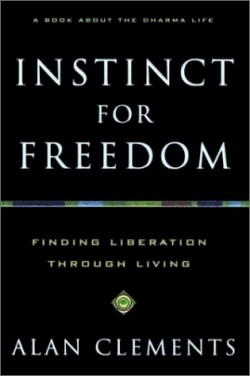Instinct for Freedom
A Spiritual Guide for Finding Liberation Through Living
In 1990, the author, an American who was once a Buddhist monk with spiritual roots in Burma, clandestinely re-enters that country while its regime is holding its people hostage, sealing the borders and exterminating the rural population. The Burma that Clements knew as a monk no longer exists.
Rape, cannibalism, and terror have replaced peaceful twenty-hour meditation and self-awareness practice. Clements finds himself alone in the forest, a non-combatant with a gun in his hand, guarding a prisoner who is believed to have killed his friend. Here, the peaceful teachings of the Buddha seem so distant, and yet in the eyes of the prisoner, also a former monk, and in the author’s heart their deepest meanings are revealed: he sees the man he is guarding not just as an enemy, but as a brother.
Clements, author of [title=book]Burma: The Next Killing Fields[title=book] and co-author of The Voice of Hope, is now a teacher in Vancouver, British Columbia. He credits the start of his spiritual journey to having watched, at age fifteen, the televised self-immolation of a Vietnamese Buddhist monk in a public square in Saigon. The calm, orderly manner in which the monk performed this act as a protest against the suffering of his people awakened in Clements a desire to seek that which gives meaning to human life. His subsequent spiritual journey reads like an adventure tale: he not only returns to war-ravaged Burma, but also lives in the former Yugoslavia during the last years of its war.
Clements discusses indoctrination and its role in spiritual seeking vs. “natural freedom,” questioning why people are so reluctant to live at the edge of their own quest for truth and choose instead to believe even that which does not make sense in order to “belong.” He asks what is left after we transcend the “isms” that make us who we think we are and advocates a “World Dharma” based in the awareness that no one is truly free until all are free. Not rooted in visions of an “afterlife,” Clements’s natural freedom would allow all to live and die with a deep and abiding sense of personal goodness and beauty. He posits that it is out of this awareness of freedom as the highest good that the ability to do something magnificent with one’s life arises.
After a long and difficult journey, Clements offers hope that it is possible to find one’s freedom in engaging the world, and that in this engagement lies the possibility of doing something magnificent with one’s life.
Reviewed by
Kristine Morris
Disclosure: This article is not an endorsement, but a review. The publisher of this book provided free copies of the book to have their book reviewed by a professional reviewer. No fee was paid by the publisher for this review. Foreword Reviews only recommends books that we love. Foreword Magazine, Inc. is disclosing this in accordance with the Federal Trade Commission’s 16 CFR, Part 255.


